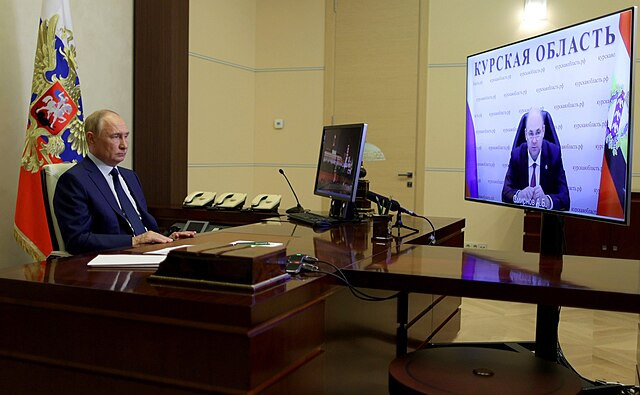Russian forces have launched a fierce counteroffensive against Ukrainian troops that crossed into Russian territory last week, marking the most significant breach of Russia's borders since the war began. The Ukrainian advance, which saw President Volodymyr Zelensky's forces seize nearly 386 square miles of territory in the Kursk region, has prompted a robust military response from Moscow. Russian President Vladimir Putin has vowed a "worthy response" to what he has termed a major provocation by Kyiv.
The Ukrainian incursion, which began unexpectedly a week ago, has exposed vulnerabilities in Russia's border defenses, forcing Moscow to hastily evacuate over 200,000 civilians and deploy reinforcements to the contested area. The surprise assault, described by Ukrainian officials as a strategic move to disrupt Russian military operations and enhance Ukraine's negotiating position, has left both nations grappling with the implications of this bold military gamble.
"Russia brought war to others, and now it is coming home," Zelensky declared in a message on Monday night, framing the operation as a defensive measure to prevent further Russian attacks on Ukrainian soil. The Ukrainian leader emphasized that the Kursk region had been used as a launchpad for numerous strikes against Ukraine, making the cross-border offensive a matter of national security.
However, the Ukrainian advance has not gone unchallenged. Russian forces have responded with a barrage of missile strikes, drone attacks, and airstrikes, which have reportedly slowed the Ukrainian momentum. Russian military bloggers and state media have described intense battles along the Kursk front, where Ukrainian forces are attempting to expand their control. Despite these efforts, Russian officials claim to have repelled many of the Ukrainian attacks, with Major General Apti Alaudinov, commander of the Chechen Akhmat special forces unit, asserting that the "uncontrolled ride of the enemy has already been halted."
The situation on the ground remains fluid, with conflicting reports emerging from both sides. Ukrainian General Oleksandr Syrskyi stated that Ukraine now controls about 1,000 square kilometers (386 square miles) of Russian territory. In contrast, Alexei Smirnov, the acting governor of the Kursk region, acknowledged Ukrainian control over 28 settlements but estimated the occupied area at roughly half the size claimed by Ukraine.
The Ukrainian incursion has undoubtedly placed significant pressure on the Russian military and political leadership. Putin, visibly frustrated during a televised meeting with top officials, has ordered his forces to dislodge the Ukrainian troops from Russian soil and has promised to accelerate Russia's advance along other parts of the front. The foreign occupation of Russian territory represents not only a strategic setback for Moscow but also a symbolic embarrassment for Putin, whose narrative of invincibility is now being challenged.
The risks associated with this Ukrainian offensive are considerable. By dedicating significant resources to the Kursk operation, Kyiv may inadvertently expose other parts of its front lines to Russian advances. With Russia's far larger military, there is a genuine concern that Ukrainian forces could become encircled if Russian reinforcements manage to regain control of the contested areas.
Western leaders, who have been steadfast in their support for Ukraine, are now closely monitoring the situation. There is a palpable unease among Ukraine's allies regarding the potential for escalation, particularly given the proximity of the fighting to NATO's borders. Some Western officials have expressed surprise at the boldness of Ukraine's move, noting that they were not informed in advance of the planned incursion.
As the conflict continues to evolve, the broader implications of Ukraine's cross-border offensive remain unclear. Putin has accused the West of using Ukraine to wage a proxy war against Russia, and the incursion into Kursk is seen by Moscow as an attempt to destabilize Russian society and undermine its territorial integrity. The Russian Foreign Intelligence Service (SVR) has warned that Zelensky's actions could lead to an escalation far beyond Ukraine's borders, raising concerns about the potential for a wider conflict.
In the meantime, the humanitarian impact of the fighting is growing. Local officials in Kursk have reported that over 121,000 people have already been evacuated, with another 59,000 in the process of being moved to safer areas. Similarly, in the neighboring Belgorod region, which has also seen Ukrainian advances, 11,000 civilians have been displaced.






